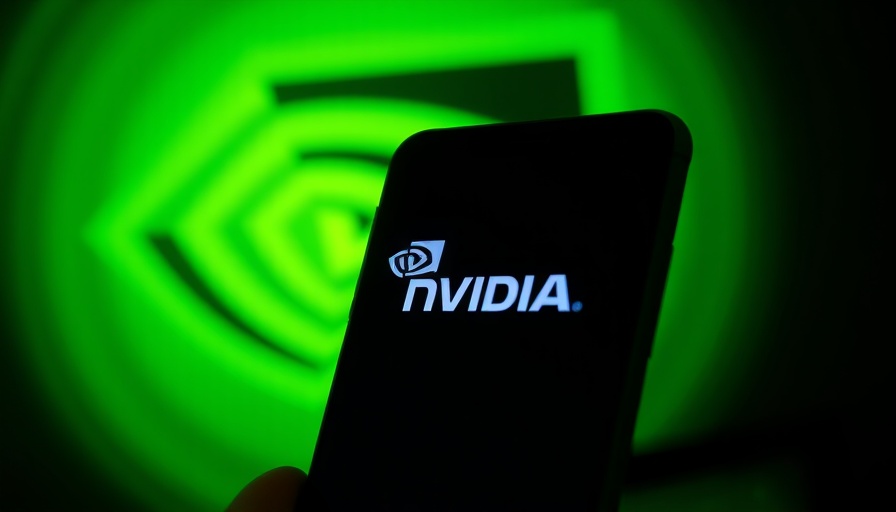
Nvidia’s Strategic Move to Restart H20 Chip Sales
Nvidia’s recent decision to resume sales of its H20 AI chips to China is a pivotal moment in the ongoing dynamics of international trade, particularly concerning technology and rare-earth elements. After initially announcing its withdrawal from the Chinese market, Nvidia filed an application to restart these sales, a move likely influenced by trade discussions surrounding rare-earth elements with the U.S. Commerce Secretary Howard Lutnick pointing out that this venture correlates with the complexities of U.S.-China trade relations.
Rare-Earth Elements: The Hidden Power Behind Technology
Rare-earth elements (REEs) have become essential in the production of various technologies, including rechargeable batteries for electric vehicles and critical semiconductor components. Most notably, China controls a significant portion of the global supply of these elements, making them a key asset in technological manufacturing and international negotiations.
A recent report revealed that elements like lanthanum and cerium are indispensable to modern technologies, and their scarcity can affect the production capabilities of tech giants. This reality places Nvidia’s decision to cater to China into a broader context of supply-chain vulnerabilities and geopolitics.
Political Reactions and Concerns
Not all officials are pleased with Nvidia's strategic reversal. Congressman Raja Krishnamoorthi voiced concerns, arguing that selling advanced technology to foreign adversaries undermines U.S. security and the administration’s position on export controls. He contends that this could have sweeping implications for national security and technological leadership.
Conversely, Lutnick downplayed the controversy, arguing that the H20 is “not the best” chip Nvidia has to offer. He emphasized that by not providing their top-tier technology, Nvidia is maintaining some level of control.
The Unfolding AI Arms Race
Just days after rumors of Nvidia's new chip tailored for the Chinese market emerged, the broader implications of such actions cannot be ignored. The competition in artificial intelligence, reinforced by China’s aggressive advancement in tech, continues to compel companies to find workarounds that align with U.S. legislation while still engaging in this lucrative market.
The Trump administration's withdrawal from parts of the Biden administration's AI Diffusion Rule only adds to the uncertainty, as U.S. authorities scramble to define the future of AI export regulations.
The Future of Technology Trade
The landscape of technology trade between the U.S. and China is in flux, highlighting a need for companies like Nvidia to tread carefully. The reengagement with the Chinese market brings forth a multitude of economic opportunities, but it also raises questions about ethical obligations and security risks. Will Nvidia’s strategic reprieve open the door for more tech companies to navigate similar deals, or will it lead to increased scrutiny on foreign investments and partnerships? The answers remain to be seen as we follow the latest tech news developments.
Broader Industry Impacts
Nvidia’s actions, set against the backdrop of significant geopolitical tension, reflect the complexities of fueling technological advancements while engaging in international trade. As trade talks on rare-earth elements continue, other tech companies, including AMD, may follow suit in reviving their businesses in China, spurred by a similar rationale.
This blend of opportunity and risk underscores how intertwined the technology sector has become with global politics, making developments in technology news more critical than ever for industry stakeholders.
Understanding the Risks and Opportunities
The situation begs a broader understanding of risks involved in technology transfer and the geopolitical ramifications of allowing foreign entities access to advanced technology. As the world watches these developments unfold, it becomes increasingly vital to remain informed about how tech and international relations intertwine. Technology news outlets will be crucial in propagating dialogue on these pressing issues as they evolve.
Final Thoughts on Technology Trade Dynamics
The resumption of H20 chip sales signals a pivot in Nvidia's strategy amidst trade uncertainty, raising vital questions about the interplay between technology, geopolitics, and economic competitiveness. Stakeholders in tech and global affairs must stay vigilant as the U.S. and China navigate this complex landscape.
 Add Row
Add Row  Add
Add 



Write A Comment